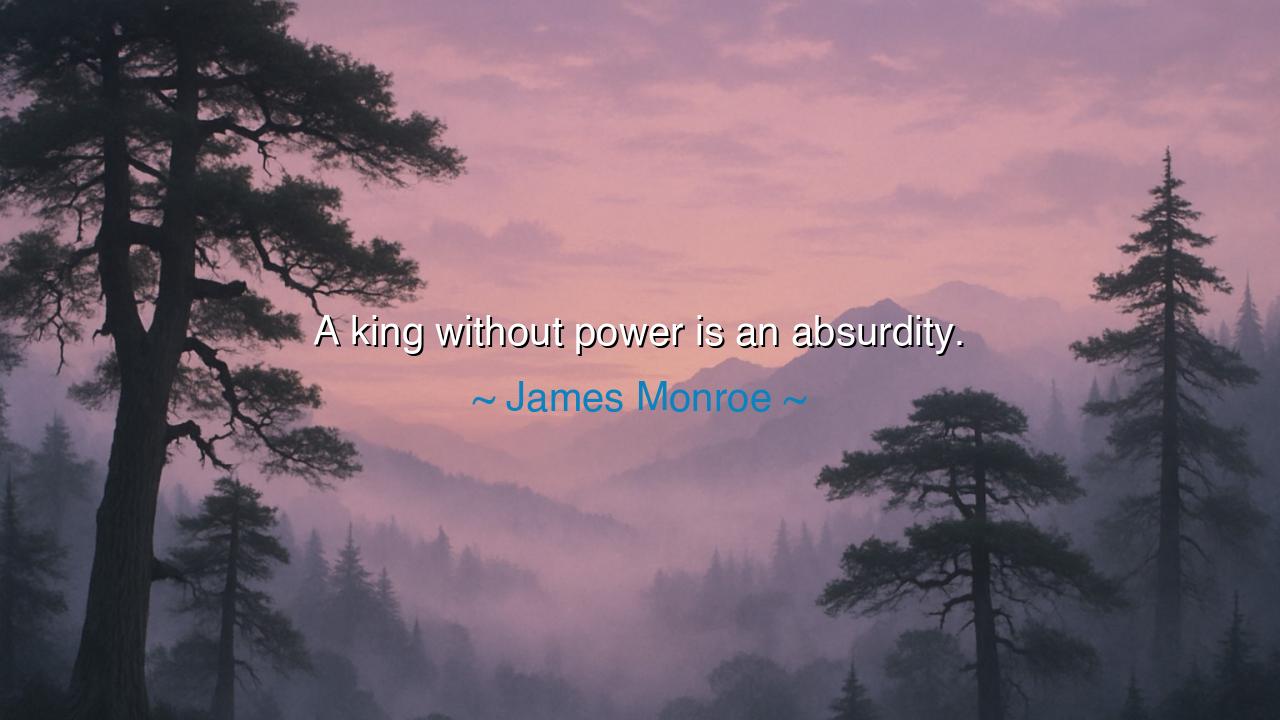
A king without power is an absurdity.






Hearken, O children of the ages, to the austere and piercing words of James Monroe, who speaks of the inseparable union of kingship and power. He teaches that to bear the title of ruler without the authority to command, to act, and to enforce, is a folly and an absurdity. For a crown without power is a mere ornament, a hollow echo of sovereignty, incapable of shaping the fate of nations or guiding the hearts of men.
Monroe reminds us that power is the instrument through which the responsibilities of rulership are fulfilled. Titles alone do not command loyalty, enforce justice, or protect the realm; only the capacity to act and to influence confers legitimacy upon authority. A king without power may be revered in name, yet he is impotent in effect, a figurehead without consequence, and his reign becomes a theatre of illusion rather than a force of governance.
Consider the tragic fate of Louis XVI of France, whose crown could not shield him from the storms of revolution. Though a king in title, his inability to wield effective power rendered him helpless against the tides of social unrest, economic collapse, and political intrigue. His monarchy became an absurdity in the eyes of the people, for the trappings of authority could not compensate for the absence of decisive influence and command.
Even in subtler realms, this principle endures. A leader, general, or magistrate who lacks the capacity to enact decisions, to inspire obedience, or to enforce laws is, in effect, a king without power. Titles and honors may adorn him, yet without the means to act, he cannot fulfill the trust placed upon him, and his authority crumbles beneath the weight of expectation and circumstance.
O children of the future, carry this teaching in your hearts: understand that titles and honor are hollow unless backed by the strength to act and the wisdom to wield authority. Let every ruler, every leader, and every person entrusted with responsibility recognize that power is inseparable from duty, and that without it, authority is not only ineffectual, but an absurdity. In this understanding lies the essence of true governance, courage, and influence.
If you desire, I can also craft a visual, ancient scroll-style presentation of this passage to capture the heroic, timeless, and deeply instructive essence of Monroe’s teaching on kingship, power, and authority.






CNhuyen cidy nguyen
I find this quote provocative because it challenges the notion of inherited or nominal authority. How often do institutions fail when the figurehead lacks the ability to act decisively? Could modern parallels exist in politics, corporations, or organizations where leaders hold positions but cannot influence outcomes? I’d like perspectives on the consequences of powerlessness in positions traditionally associated with command and respect.
DTTran Duc Thinh
I’m curious about the philosophical dimension. Why is a title without power considered absurd—does it reflect human expectations about leadership, or is it a logical necessity? Could there be scenarios where the symbolic presence of a powerless king serves a social or unifying function despite lacking real authority? I’d like to examine examples where the perception of leadership mattered more than the execution of power.
CDKim Chi Dam
This raises questions about governance and responsibility. If authority is stripped from a monarch, does retaining the title become a danger or merely an absurdity? How do societies ensure that symbolic leadership doesn’t mislead or create confusion about actual decision-making power? I’d love to explore mechanisms that separate ceremonial prestige from functional authority in both historical and contemporary systems.
EDEmilya Diamond
I feel intrigued by the tension between title and influence. Could a king without power still hold moral or cultural authority, or is political control essential for meaningful leadership? How does this idea translate to modern contexts, like figureheads in constitutional monarchies or CEOs with limited operational authority? I’d like perspectives on whether power is inherently tied to legitimacy or if leadership can exist in other forms.
宝欣张 宝 欣
This makes me reflect on the relationship between authority and legitimacy. Can a leader truly exist without the power to enforce decisions or protect their realm? How do symbolic or ceremonial roles compare to positions of actual authority? I’d like to explore historical examples of kings or rulers who had titles but lacked real power, and how their reigns were perceived by contemporaries and historians alike.